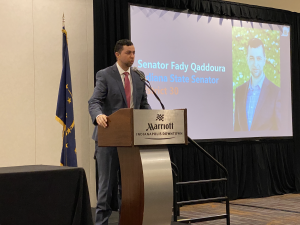Political Update
Indiana
2021 has been another successful year for Indiana politics. The IKORCC managed to harvest a great relationship with the Indiana Association of Public-School Superintendents (IAPSS) and received an invitation to go on tour with them for all eight of their district meetings. During the tour, we were introduced to public school superintendents in all 92 counties. In addition, we were given the opportunity to talk about our Door Safety Inspection (DSI) Program and Career Connections.
One of our many focuses was on getting more “Responsible Bidder Language” added into front end bid specs with school corporations. During the 2021 year, we were able to obtain an additional two agreements with the Metropolitan School District of Boone Township and Concord Community Schools.
Other events worth mentioning that took place during the 2021 year are several successful meetings with political figures regarding laws being introduced to support ICRA training requirements being put in place if any work is being done in occupied health care facilities or schools that may have students present. Also, the City of Indianapolis has promised to make tax fraud and worker misclassification its number one priority for 2022. This commitment came directly from Mayor Joe Hogsett during a public speech that he gave to the city.

During the Delegates conference, Senator Fady Quadra (left) spoke to the membership and explained his level of respect for the Carpenters Union and other organized labor affiliates. He affirmed that he would carry the Carpenters ICRA legislation in 2022.
Due to line redistricting, a Senate seat for District 46 has come up for grabs. We have successfully sourced a candidate that is a card-carrying member of AFSCME whom we helped get elected to the Indianapolis City County Council, to go after this open seat. The candidate has confirmed they will make it known that this seat will be a union held seat if elected. This seat will be won during the primaries due to it being a largely held partisan district.
Kentucky
2021 was a busy political year in Kentucky. Even with the COVID-19 restrictions we’ve been able to build great relationships with local lawmakers and state legislators. Our goals in Kentucky are to address tax fraud and ensure we are in the best position to secure our work with the influx of new solar projects coming to the area.
With solar, it is our hope to introduce language similar to legislation that exists in other states that would protect our work and put our contractor base in the best position possible to secure solar work. Our solar committee, headed up Jeremy Welch and Wallace Turner, has done a tremendous job working with developers and owners to provide information to the political team. That info is vital in working with our lawmakers to sell our training and the importance of the upcoming work.
Tax fraud is a major problem in Kentucky. 1099 worker misclassification and the cash under the table business model used by non-signatory contractors has put our contractor base at huge disadvantage. Working with our Director of Organizing Kenneth Lyons and our political team, we’ve been taking local and state legislators to job site visits to show them the impact and loss of tax revenue that is currently going on.
Now that the November local elections are over, we will actively continue to educate local elected officials about our issues. We use our training facilities to conduct tours and plan to ramp up job site visits. Do not discount the importance you have in actively participating to successfully reach our goals.
If you are not registered to vote please do so. You can register online at vrsws.sos.ky.gov. Moving into 2022 there will be very important races all across Kentucky.
Ohio
2021 was a challenge, politically. Our approach in building relationships with lawmakers became more difficult as a result of the COVID-19 mandates throughout Ohio. Thankfully, we found creative ways to continue building relationships with our local and state lawmakers. We use our four self-funded Ohio training centers as our main selling point with politicians. We continue to take elected officials out for jobsite visits to showcase what we do and also highlight the bad jobsites where tax fraud is rampant due to the lack of legislation in Ohio.
As a result, we continue to build support from both sides of the aisle – Democrat and Republican. We have been successful in protecting our core issues such as Prevailing Wage, Right to Work, and Unemployment Compensation. We are now using our relationships to introduce language to address tax fraud. Our tax fraud bill will create a Tax Fraud Commission to study the impact that paying cash under the table and worker misclassification abuse is having, not only to us but every taxpayer within Ohio. We are aggressively lobbying on current issues to protect our work within all four refineries in the state.
Our motto has always been to Educate, Agitate, and Organize. These very same principles are used when working with any elected lawmaker. Our Ohio political team covers all corners of the state and we will keep every UBC member informed of legislation that may affect us.
With the 2022 election cycle upcoming we will be very busy working for current lawmakers we support and going through a vetting process for any open seats to ensure that the right lawmakers are elected. If you are not already registered to vote, please do so.
You can register online at ohiosos.gov. Remember that when a recommendation is made to support a candidate they are soundly in support of protecting your work, your career, and your ability to provide for your family.

